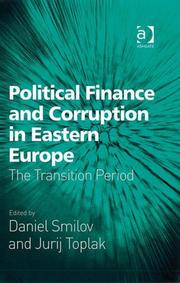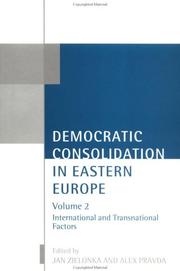| Listing 1 - 10 of 10 |
Sort by
|
Book
ISBN: 9780199698110 9780199572533 0199698112 0199572534 Year: 2012 Publisher: Oxford: Oxford university press,
Abstract | Keywords | Export | Availability | Bookmark
 Loading...
Loading...Choose an application
- Reference Manager
- EndNote
- RefWorks (Direct export to RefWorks)
Democratization. --- Democracy. --- Democracy --- Democratization --- Démocratisation --- Démocratie --- Démocratisation --- Démocratie --- Democratization - Europe, Southern --- Democracy - Europe, Southern --- Democratization - Europe, Eastern --- Democracy - Europe, Eastern --- Democratization - Latin America --- Democracy - Latin America
Book
ISBN: 9781138831827 9781138716643 9781315736358 9781317566731 9781317566748 1138716642 1138831824 Year: 2015 Volume: 30 Publisher: Abingdon: Routledge,
Abstract | Keywords | Export | Availability | Bookmark
 Loading...
Loading...Choose an application
- Reference Manager
- EndNote
- RefWorks (Direct export to RefWorks)
At first, it was believed that accession to the EU would have a positive effect on the process of democratization in former communist countries. However, over time it became clear that difficulties with the democratic system endured in a number of these countries. This book reconsiders the results of the process of democratization in Central and Eastern Europe and evaluates the nature and effectiveness of the Europeanization process. It comparatively explores the process of democratic consolidation and accession to the European Union in Poland, Slovakia and Bulgaria. Using these case studies, the book assesses the impact of the EU on the accountability and integrity of governments in this part of Europe. This text will be of key interest to scholars and students of democratization studies, European studies, EU studies, transition studies, area studies, and international relations
DEMOCRATIZATION--EUROPE, CENTRAL --- DEMOCRATIZATION-- EUROPE, EASTERN --- DEMOCRATIZATION--EU --- Democratization --- Démocratisation --- Relations extérieures --- Government policy --- Politique publique --- European Union countries --- Europe, Central --- Europe, Eastern --- Foreign relations --- Démocratisation --- Relations extérieures

ISBN: 1134835701 1280322527 0203410831 0203319672 9780203319673 9780203410837 9780415110631 0415110637 9780415110648 0415110645 661032252X 9786610322527 0415110637 0415110645 9781134835706 9781280322525 9781134835652 1134835655 9781134835690 1134835698 Year: 1996 Publisher: London: Routledge,
Abstract | Keywords | Export | Availability | Bookmark
 Loading...
Loading...Choose an application
- Reference Manager
- EndNote
- RefWorks (Direct export to RefWorks)
In light of the sudden collape of communist systems in Eastern Europe in 1989-90, this book attempts to explain their democratization from a variety of theoretical perspectives.
Democracy --- Post-communism --- Europe, Eastern --- Politics and government --- Political systems --- Eastern and Central Europe --- Démocratie --- Postcommunisme --- Europe de l'Est --- Politique et gouvernement --- Democratization --- Democracy - Europe, Eastern --- Democratization - Europe, Eastern --- Post-communism - Europe, Eastern --- Europe, Eastern - Politics and government - 1989 --- -Democracy --- -Political systems
Book
ISBN: 9782296051164 2296051162 Year: 2008 Publisher: Paris: L'Harmattan,
Abstract | Keywords | Export | Availability | Bookmark
 Loading...
Loading...Choose an application
- Reference Manager
- EndNote
- RefWorks (Direct export to RefWorks)
Non-governmental organizations --- Democracy --- Organisations non-gouvernementales --- Démocratie --- Democratization --- Student movements --- Political aspects --- Europe, Eastern --- Politics and government --- Démocratie --- Democratization - Europe, Eastern. --- Non-governmental organizations - Political aspects - Europe, Eastern. --- Student movements - Europe, Eastern. --- Europe, Eastern - Politics and government - 1989 --- -Non-governmental organizations --- -Democratization
Book
ISBN: 3653058538 3653963508 9783631665268 3631665261 Year: 2015 Publisher: Frankfurt am Main: Peter Lang,
Abstract | Keywords | Export | Availability | Bookmark
 Loading...
Loading...Choose an application
- Reference Manager
- EndNote
- RefWorks (Direct export to RefWorks)
The book contributes to the ongoing discussion and research on civil society in the context of democracy and democratization. It provides a theoretical analysis of civil society, participation, the public sphere and democratic consolidation in light of normative democratic theory and the challenges of democratic transformation in Central and Eastern Europe. It also offers a novel approach to some of the key issues in that debate including corruption and democratic consolidation, active citizenship, civic unity and the rule of law as well as theories of democratization. Finally, it asks the question as to whether a properly functioning democracy must be complemented with civil society and the numerous roles it plays in a political community of free citizens.
Civil society --- Democracy --- Democratization --- Democratic consolidation --- Democratic transition --- Political science --- New democracies --- Self-government --- Equality --- Representative government and representation --- Republics --- Social contract --- Europe, Eastern --- Europe, Central --- Politics and government --- Civil society - Europe, Eastern --- Civil society - Europe, Central --- Democracy - Europe, Eastern --- Democracy - Europe, Central --- Democratization - Europe, Eastern --- Democratization - Europe, Central --- Europe, Eastern - Politics and government - 1989 --- -Europe, Central - Politics and government - 1989 --- -Civil society --- #SBIB:324H60 --- #SBIB:324H71 --- Politieke socialisatie --- Politieke verandering: modernisatie, democratisering, regional development
Book
ISBN: 1316805506 1316783464 1316800393 110717371X 1316625966 9781316625965 9781107173712 9781316783467 Year: 2016 Publisher: New York, N.Y.: Cambridge university press,
Abstract | Keywords | Export | Availability | Bookmark
 Loading...
Loading...Choose an application
- Reference Manager
- EndNote
- RefWorks (Direct export to RefWorks)
Where Did the Revolution Go? considers the apparent disappearance of the large social movements that have contributed to democratization. Revived by recent events of the Arab Spring, this question is once again paramount. Is the disappearance real, given the focus of mass media and scholarship on electoral processes and 'normal politics'? Does it always happen, or only under certain circumstances? Are those who struggled for change destined to be disappointed by the slow pace of transformation? Which mechanisms are activated and deactivated during the rise and fall of democratization? This volume addresses these questions through empirical analysis based on quantitative and qualitative methods (including oral history) of cases in two waves of democratization: Central Eastern European cases in 1989 as well as cases in the Middle East and Mediterranean region in 2011.
Democratization --- Social movements --- Arab Spring, 2010 --- -Arab Awakening, 2010 --- -Democratic consolidation --- Democratic transition --- Political science --- New democracies --- Movements, Social --- Social history --- Social psychology --- Political aspects --- Europe, Eastern --- Arab countries --- Arab world --- Arabic countries --- Arabic-speaking states --- Islamic countries --- Middle East --- Politics and government --- -Political aspects --- Democratization - Europe, Eastern --- Social movements - Political aspects - Europe, Eastern --- Democratization - Arab countries --- -Europe, Eastern - Politics and government - 1989 --- -Arab countries - Politics and government - 21st century --- -Europe, Eastern --- -Democratization

ISBN: 9780754670469 9781315601182 9781317078777 9781317078784 0754670465 Year: 2007 Publisher: Aldershot, Hants, England: Ashgate,
Abstract | Keywords | Export | Availability | Bookmark
 Loading...
Loading...Choose an application
- Reference Manager
- EndNote
- RefWorks (Direct export to RefWorks)
Campaign funds --- Political corruption --- Democratization --- Caisses électorales --- Corruption politique --- Démocratisation --- Case studies. --- Cas, Etudes de --- Europe, Eastern --- Europe de l'Est --- Politics and government --- Politique et gouvernement --- -Political corruption --- -Democratization --- -324.780947 --- Democratic consolidation --- Democratic transition --- Political science --- New democracies --- Boss rule --- Corruption (in politics) --- Graft in politics --- Malversation --- Political scandals --- Politics, Practical --- Corruption --- Misconduct in office --- Assessments, Political --- Campaign contributions --- Campaign expenditures --- Campaign finance --- Election contributions --- Elections --- Political assessments --- Political campaigns --- Political parties --- Corrupt practices --- Finance --- East Europe --- Eastern Europe --- -Campaign funds --- Caisses électorales --- Démocratisation --- Campaign funds - Europe, Eastern - Case studies --- Political corruption - Europe, Eastern - Case studies --- Democratization - Europe, Eastern - Case studies --- Europe, Eastern - Politics and government - 1989- - Case studies

ISBN: 1403903077 9781403903075 Year: 2003 Publisher: [Basingstoke]: Palgrave MacMillan,
Abstract | Keywords | Export | Availability | Bookmark
 Loading...
Loading...Choose an application
- Reference Manager
- EndNote
- RefWorks (Direct export to RefWorks)
Political parties --- New democracies --- Democratization --- Europe, Eastern --- Europe, Southern --- #SBIB:041.AANKOOP --- #SBIB:324H43 --- #SBIB:328H27 --- Politieke structuren: politieke partijen --- Instellingen en beleid: Midden- en Centraal Europa: algemeen --- Parties, Political --- Party systems, Political --- Political party systems --- Countries, Newly democratic --- Democracies, New --- Democratic states, New --- Emerging democracies --- Nations, Newly democratic --- New democratic states --- Newly democratic states --- States, Newly democratic --- Democratic consolidation --- Democratic transition --- Political science --- Divided government --- Intra-party disagreements (Political parties) --- Political conventions --- Democracy --- Newly independent states --- Political parties - Europe, Eastern - Case studies --- Political parties - Europe, Southern - Case studies --- New democracies - Europe, Eastern - Case studies --- New democracies - Europe, Southern - Case studies --- Democratization - Europe, Eastern - Case studies --- Democratization - Europe, Southern - Case studies

ISBN: 1282052586 9786612052583 0191529192 9780191529191 9780199244096 019924409X 019924409X 9780199241675 9780199244089 9780199241682 0199241678 0199244081 0199241686 Year: 2003 Publisher: Oxford: Oxford university press,
Abstract | Keywords | Export | Availability | Bookmark
 Loading...
Loading...Choose an application
- Reference Manager
- EndNote
- RefWorks (Direct export to RefWorks)
This book provides an unprecedented country-by-country examination of the specific experience of the democratic transitions experienced by the states of Eastern Europe. It concentrates on the influence of the international environment on these fledgling democracies.
Constitutional history -- Europe, Eastern. --- Constitutional history -- Former Soviet republics. --- Democratization -- Europe, Eastern. --- Democratization -- Former Soviet republics. --- Europe, Eastern -- Politics and government -- 1989-. --- Former Soviet republics -- Politics and government. --- #SBIB:328H27 --- 281 Politiek per land (behalve Belgie) --- #A0306A --- 320.94 --- Be1 --- Democratization --- -Democratization --- -Constitutional history --- -Democratic consolidation --- Democratic transition --- Political science --- New democracies --- Constitutional history, Modern --- Constitutional law --- Constitutions --- History --- Instellingen en beleid: Midden- en Centraal Europa: algemeen --- Europe, Eastern --- Former Soviet republics --- -CIS countries --- Commonwealth of Independent States countries --- Ex-Soviet republics --- Ex-Soviet states --- Former Soviet states --- New Independent States (Former Soviet republics) --- Newly Independent States (Former Soviet republics) --- NIS (Former Soviet republics) --- East Europe --- Eastern Europe --- Politics and government --- -Politics and government --- -Constitutional history, Modern --- Democratic consolidation --- Constitutional history - Europe, Eastern --- Constitutional history - Former Soviet republics --- Democratization - Europe, Eastern --- Democratization - Former Soviet republics --- Democratisation - Europe de l'Est --- Democratisation - Ex-URSS --- Europe, Eastern - Politics and government - 1989 --- -Former Soviet republics - Politics and government --- Démocratisation --- Europe de l'Est --- Ex-URSS --- Constitutional history --- Politique et gouvernement --- Histoire constitutionnelle --- Democratisation --- -Europe, Eastern --- Politics and government.

ISBN: 2800412828 9782800412825 Year: 2002 Volume: *8 Publisher: Bruxelles: Éditions de l'Université de Bruxelles,
Abstract | Keywords | Export | Availability | Bookmark
 Loading...
Loading...Choose an application
- Reference Manager
- EndNote
- RefWorks (Direct export to RefWorks)
L’étude des partis politiques d’Europe centrale et orientale est d’autant plus intéressante que les tentatives de créer des organisations post-partisanes se sont multipliées après la chute des régimes communistes. La mouvance de la dissidence pensait pouvoir se passer des partis politiques souvent décriés et vilipendés. Or, force est de constater qu’ils se sont révélés indispensables dans le processus de démocratisation des pays d’Europe centrale et orientale. Cet ouvrage propose un premier bilan général de l’état des partis politiques de la région, dans une perspective résolument comparative. La première partie plante le décor : elle étudie l’implantation géographique des partis et les situe dans leur contexte historique et par rapport à la mouvance « anti-communiste ».La deuxième partie traite d’un des phénomènes les plus marquants de l’après-communisme : la reconversion des partis communistes, en Pologne, où elle a réussi, en Bulgarie, où elle reste incertaine. La troisième partie analyse en détail les clivages politiques autour desquels se structurent les partis politiques dans les PECQ. Quel système de parti émerge ? Quelles familles politique sont représentées ? Les théories classiques de la science politique sont-elles applicables à cette zone géographique ? Qu’en est-il du clivage gauche/droite ? Des partis qui défendent les intérêts des minorités nationales ? De quelle nature sont les clivages ? Quel est le poids de la contrainte externe ? L’analyse met en évidence les spécificités de chaque État, elle permet aussi de comparer les paysages politiques des anciennes « démocraties populaires » avec les situations prévalant en Europe occidentale. La dernière partie s’attache au processus de démocratisation à l’œuvre dans la région : elle précise le rôle qu’y jouent les partis politiques et les effets de l’adhésion aux organisations internationales. Dix ans après la chute du mur de Berlin, les paysages politiques s’organisent peu à peu en Europe centrale et orientale. Après une période de chaos marquée par la prolifération des partis politiques, des scissions innombrables, le morcellement des parlements, les États de la région traversent aujourd’hui une nouvelle phase. Des alternances démocratiques se sont produites, des organisations partisanes ont consolidé leur structure et leur organisation, même si dans l’ensemble le processus s’avère plus long et plus complexe qu’annoncé par nombre d’observateurs.
Political parties --- Europe --- Democratization --- Europe [Central ] --- Europe [Eastern ] --- Democracy --- Politics and government --- 1989 --- -Europe [Eastern ] --- -Political parties --- Post-communism --- Partis politiques --- Démocratie --- Postcommunisme --- Europe, Central --- Europe, Eastern --- Europe centrale --- Europe de l'Est --- Politique et gouvernement --- DNPOLIT DNU-EUB EPUB-ALPHA-P EPUB-DNU-FT EPUB-LIV-FT LIVPOLIT EDITIONSULB-B --- 321.151 <4-11> --- 321.151 <4-11> Democratie --(klassieke democratie politieke stelsels)--Oost-Europa --- Democratie --(klassieke democratie politieke stelsels)--Oost-Europa --- Parties, Political --- Party systems, Political --- Political party systems --- Political science --- Divided government --- Intra-party disagreements (Political parties) --- Political conventions --- Democratic consolidation --- Democratic transition --- New democracies --- -Political parties - Europe, Central --- Democratization - Europe, Central --- Political parties - Europe, Eastern --- Democratization - Europe, Eastern --- Political parties - Europe, Central
| Listing 1 - 10 of 10 |
Sort by
|

 Search
Search Feedback
Feedback About UniCat
About UniCat  Help
Help News
News